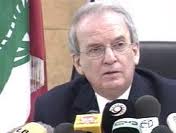
MP Marwan Hamadeh rejected the accusations of Speaker Nabih Berri that the Cedar Revolution is trying to monopolize power and said that the “revolution liberated the Lebanese from prison , but Berri is still in it, stressing that Berri’s statements are completely rejected.”
In an interview with MTV he called on the Hezbollah led March 8 alliance to free itself from the mentality of tutelage at a time when the Syrian people themselves are making sacrifices to get rid of the tutelage .
He is referring to the nearly 30 year of Syrian military presence in Lebanon.
Hamadeh asked : When did March 14 monopolize the power ? The last government of national unity included a disabling one third share ( veto power) for March 8 while March 14 did not have more than 12 Ministers out of 30 . March 8 is the one that is monopolizing power in Lebanon by trying to form a one color cabinet that is opposed to the International Tribunal and supports the illegal weapons.
Hamadeh criticized Berri call for a parliament session aimed at bypassing the role of the cabinet and predicted that next week the quorum will not be met also
Berri called last month for a June 8 parliament session but had to postpone it to June 15 because the quorum was not met.
Berri also attacked March 14 and the Cedar Revolution saying it “took Lebanon 60 years back.”
“The Cedar Revolution took us 60 years back, led to the spending of public funds, increased national debt and favored the atmosphere for more foreign interference,” Berri , a key ally of the Iranian and Syrian backed Hezbollah group said in a reference to the March 14 coalition, which was named after the largest demonstration of the Cedar revolution.

The Cedar Revolution or Independence Intifada was a chain of demonstrations in Lebanon (especially in the capital Beirut) triggered by the assassination of the former Lebanese Prime Minister Rafik Hariri on February 14, 2005.
The primary goals of the revolution were the withdrawal of Syrian troops from Lebanon and the replacement of a government heavily influenced by Syrian interests with more independent leadership, the establishment of an international commission to investigate the assassination of former Prime Minister Rafik Hariri, the resignation of security officials to ensure the success of the plan, and the organization of free parliamentary elections. The demonstrators demanded the end of the Syrian influence in Lebanese politics. At the start of the demonstrations, Syria had been maintaining a force of roughly 14,000 soldiers and intelligence agents in Lebanon. Following the demonstrations, the Syrian troops completely withdrew from Lebanon on April 27, 2005. The Pro-Syrian government was also disbanded, accomplishing the main goals of the revolution.

Leave a Reply
You must be logged in to post a comment.